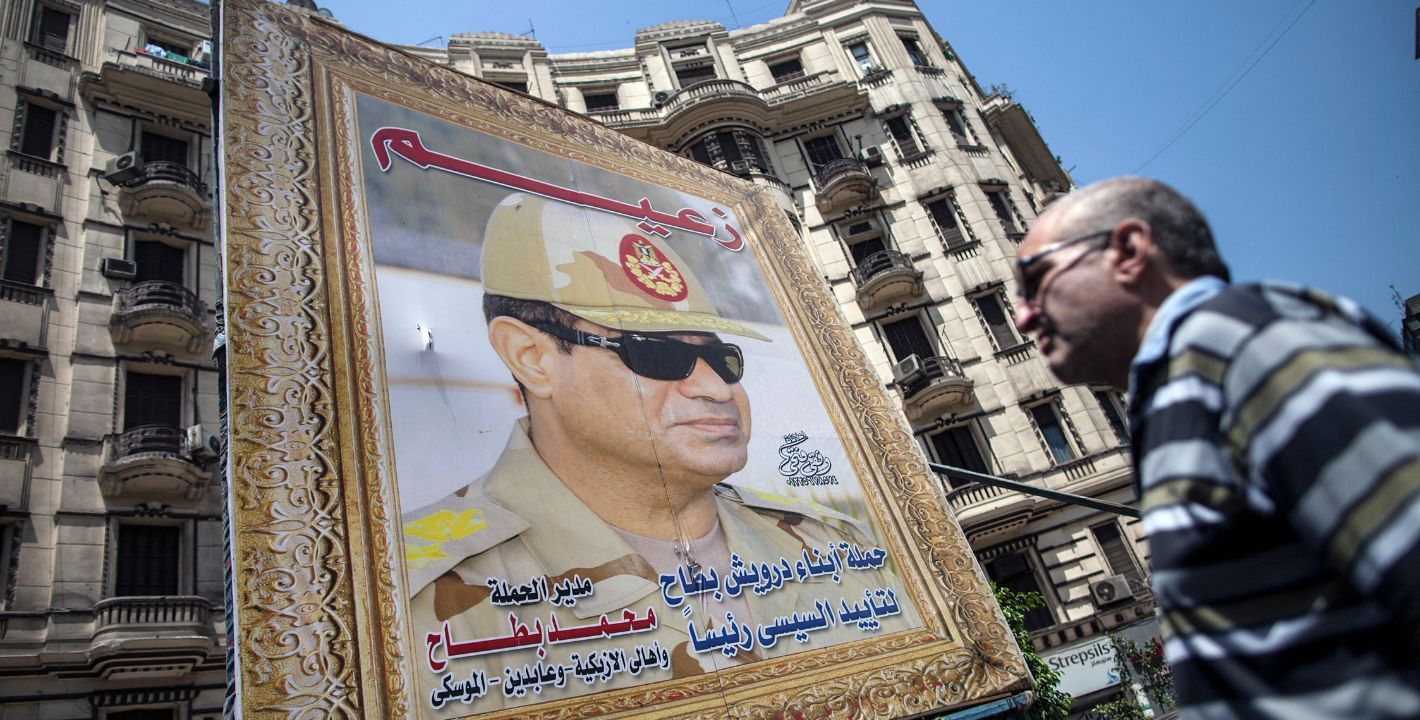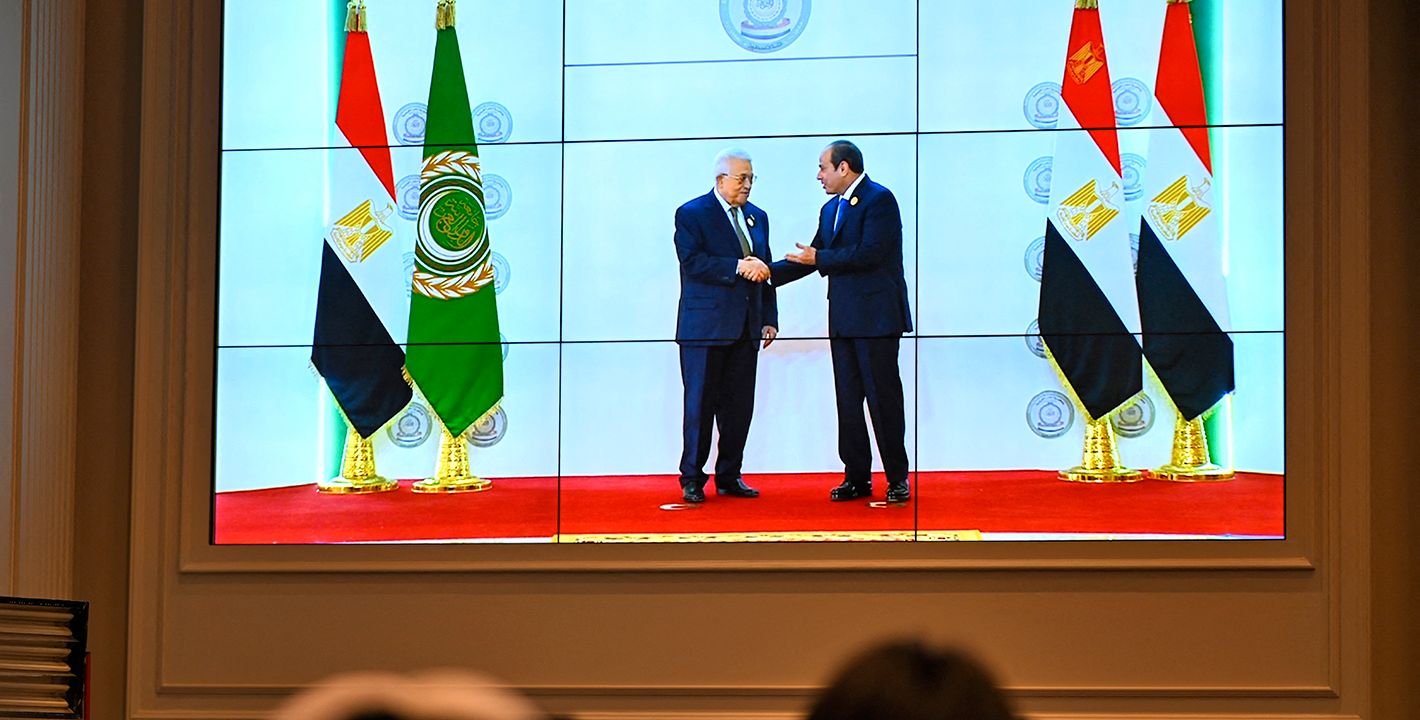Yezid Sayigh
{
"authors": [
"Yezid Sayigh"
],
"type": "commentary",
"blog": "Diwan",
"centerAffiliationAll": "",
"centers": [
"Carnegie Endowment for International Peace",
"Malcolm H. Kerr Carnegie Middle East Center"
],
"englishNewsletterAll": "",
"nonEnglishNewsletterAll": "",
"primaryCenter": "Malcolm H. Kerr Carnegie Middle East Center",
"programAffiliation": "",
"programs": [],
"projects": [],
"regions": [
"Egypt"
],
"topics": []
}
Source: Getty
Aiding and Abetting Egypt’s Behavior
The IMF seems to have abandoned structural reform, adapting to the military’s strategic economic role.
In the last few weeks of 2024, there were two developments of note for the Egyptian economy. On December 11, Prime Minister Mostafa Madbouly announced that ten state-owned enterprises (SOEs), including four military companies, would be privatized in 2025. Two weeks later, the International Monetary Fund (IMF) confirmed that it had reached a staff-level agreement to release $1.2 billion in new lending to Egypt, subject to approval by the IMF’s executive board.
The close timing of the two announcements was probably more than a coincidence. Madbouly and other government ministers had previously announced the imminent privatization of SOEs, including military companies, as a means of influencing negotiations with the IMF ahead of new loan agreements or of IMF reviews of Egyptian implementation of agreed benchmarks. More significantly, the IMF and other international financial institutions and donor agencies appear to have adapted to the military’s strategic presence and role in the economy.
The IMF seems ready to play along, even though the Egyptian government has failed signally to undertake structural reforms in fulfillment of the loan agreement reached in December 2022, and then augmented in March 2024. Most importantly, the government pledged to bring all SOEs—including military companies—within a unified framework for transparent financial management and reporting, to publish comprehensive and detailed annual and twice-yearly tax expenditure reports, to end tax exemptions for SOEs, and to improve customs procedures and information sharing.
Almost none of this has happened, apart from ending tax exemptions for SOEs—but even then, not for military companies. IMF and World Bank officials confirm privately that tax reports submitted by the government fall significantly short of requirement. It is also evident that the administration of President Abdel-Fattah al-Sisi has shrugged off repeated IMF urging since the coronavirus pandemic to slow down massive spending on public works megaprojects managed by the military. Taken together, these shortcomings render much of the agreed reform program pointless. And yet the IMF has both augmented the loan to Egypt from the $3 billion originally agreed in 2022 to $8 billion in 2024, and released further tranches of funding.
How, then, to assess a lender that claims to seek structural economic reform and yet settles repeatedly for a mirage? The fact that the Egyptian government has made much play of its efforts to privatize select SOEs over the past two years, although the IMF has not pressed for this, suggests that limited privatization is a displacement activity by authorities unwilling to undertake structural reform. By the same token, talk of privatizing a handful of military companies is similarly a distraction from the real challenge of making transparent the finances of all military companies—numbering over 70 by now—and military-managed public works. Besides, not a single share in military companies has actually been put on offer, a full eight years since their listing on the Egyptian Stock Exchange was first proposed.
In fairness, the Egyptian government lacks the political clout to assert its financial oversight over companies belonging to the all-powerful military, even if it genuinely wills to do so. The IMF knew this from the outset. Getting the Egyptian government to acknowledge formally that military companies fall under the SOE designation and that they should be brought to order financially was already an achievement for the IMF. Pushing much further was sure to be a bridge too far, and the IMF was understandably unlikely to expend limited political capital to induce specific progress regarding military companies or to make it a sine qua non for disbursement of loan tranches to the government.
In private, IMF officials insist that bringing military companies within the framework laid out in the Memorandum of Economic and Financial Policies submitted by the Egyptian government as part of the 2022 loan agreement remains important. What this still means in practice is an open question, however. The World Bank, which first publicly raised its concerns over the role of the military in the economy in 2020, is a secondary actor in this respect. But some of its staff argue privately for an “If you can’t beat them, join them” approach: since bringing about real change in the status of military companies seems impossible, better to provide them with technical assistance in the hope of making them more efficient and effective market actors, and thus ultimately of bringing them in line with best practice. Military resistance to nearly five years of attempts by the Sovereign Fund of Egypt to prepare any of its companies for public listing or for private sale to so-called “strategic investors” prompted its chairman to resign in August 2024. It appears delusional for international staff to think they can do better.
In any case, transformations in the Egyptian economy render all these questions moot. Not only has the military’s overall economic share continued to grow, but so has its direct role in economic policymaking and decisionmaking. Senior officers such as the president’s financial advisor or his plenipotentiary minister Kamel al-Wazir, the former head of the army’s engineering authority now tipped as prime ministerial material, wield greater influence than most government ministers in relation to public investment strategies. Moreover, military top brass attend all meetings held by the president to discuss economic issues, and military agencies are assuming new roles in managing the import of basic commodities such as wheat.
Talk of improving internal governance and financial management in military companies therefore misses the point by a very wide margin. It was still justified until fairly recently for the IMF, World Bank, and other international financial institutions to address the special status of military companies in the civilian economy as a subset of wider structural problems in Egypt’s political economy. But the military economy has reached a critical mass that makes such approaches woefully inadequate. More to the point, this development means that the only feasible framework for guiding policy and channeling international assistance is structural reform on the comprehensive scale promised by the Egyptian government in its Memorandum of Economic and Financial Policies.
The memorandum offered a vision of change that would have been nothing short of revolutionary if implemented. The IMF has said little about this since then, however, instead maintaining a focus on the State Ownership Policy issued by the Egyptian government in late 2022 as the crucial benchmark for its loan program. Not only did the latter document sidestep altogether the issue of the military’s activities in the civilian domain, it also engaged in misdirection by shifting the policy debate from structural reform to ownership. Indeed, the State Ownership Policy boiled down in effect to a manifesto for extensive, and in some cases increasing, state ownership and intervention in the economy. It is fundamentally lacking as a blueprint for structural reform.
The IMF, World Bank, and other international financial institutions, such as the European Bank for Reconstruction and Development, have done considerably more than allow the issue of military companies to lapse, therefore. Rather, they have abandoned genuine commitment to seeing structural reform take place in Egypt. Their country teams may have a clear grasp of the discrepancy between rhetoric and reality in recipient countries such as Egypt, but their executive boards primarily serve a political agenda—heavily shaped in the case of the IMF by the U.S. administration of the day. IMF technical staff have learned from bitter experience that getting the Egyptian authorities to “move the Sphinx to the other side of Cheops, would be easier to achieve than getting the government to deliver on tax reporting,” in the words of one veteran. But both in accepting this outcome and in glossing it over, the IMF Board is aiding and abetting the continued reshaping of the Egyptian economy in ways that are diametrically opposite to its declared objectives.
About the Author

Senior Fellow, Malcolm H. Kerr Carnegie Middle East Center
Yezid Sayigh is a senior fellow at the Malcolm H. Kerr Carnegie Middle East Center in Beirut, where he leads the program on Civil-Military Relations in Arab States (CMRAS). His work focuses on the comparative political and economic roles of Arab armed forces, the impact of war on states and societies, the politics of postconflict reconstruction and security sector transformation in Arab transitions, and authoritarian resurgence.
- All or Nothing in GazaCommentary
- Has Sisi Found a Competent Military Entrepreneur?Commentary
Yezid Sayigh
Recent Work
Carnegie does not take institutional positions on public policy issues; the views represented herein are those of the author(s) and do not necessarily reflect the views of Carnegie, its staff, or its trustees.
More Work from Diwan
- Has Sisi Found a Competent Military Entrepreneur?Commentary
Mustaqbal Misr has expanded its portfolio with remarkable speed, but a lack of transparency remains.
Yezid Sayigh
- Sisi the SupremeCommentary
The president has blocked the emergence of new power centers within the Egyptian regime.
Yezid Sayigh
- Saying No to Trump’s ‘Riviera’ PlanCommentary
In an interview, Marwan Muasher discusses the Arab proposal to rebuild Gaza, and its repercussions.
Ghida Tayara, Jasmine Khelil
- A Lot of Gray in Going GreenCommentary
In an interview, Yezid Sayigh discusses how military-managed projects in Egypt can advance environmental objectives.
Michael Young
- Abdel-Fattah al-Sisi Is on the Back FootCommentary
A resignation suggests that Egypt’s president has accepted defeat in the struggle to privatize military-owned companies.
Yezid Sayigh






